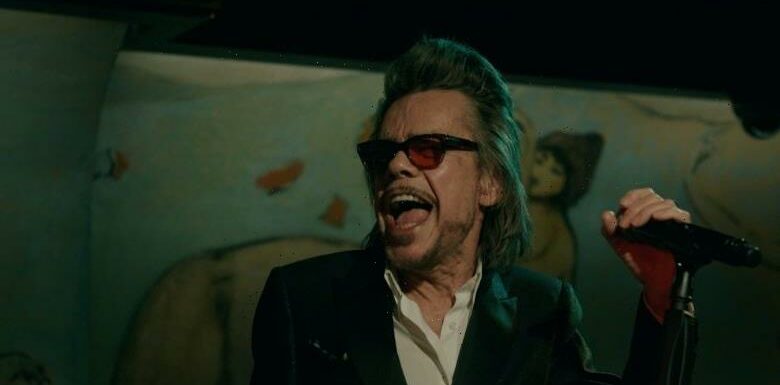
A dirty martini of a music biodoc that finds Martin Scorsese (and his “The 50 Year Argument” co-director David Tedeschi) shining a warm spotlight on yet another New York institution, “Personality Crisis: One Night Only” profiles one of rock and roll’s most protean icons — a chameleon who’s gone from androgynous punk to gravel-voiced lounge lizard and a million people in between while always remaining utterly himself.
David Johansen has lived (and outlived) so many lives that the MC at Manhattan’s Café Carlyle hardly seems to believe that the (now) 72-year-old former New York Dolls frontman is still alive to perform in January 2020. Then again, the cabaret show that forms the spine of this film isn’t really one of his concerts. The pompadoured hepcat who’s summoned to the stage in the opening moments is an alter-ego who goes by the name of Buster Poindexter — you might remember him from such insufferable earworms as 1982’s “Hot Hot Hot” — but, for one night only, he’ll be singing the songs of David Johansen.
And yet, while Poindexter’s finger-snapping “covers” of squelchy jams like “Funky but Chic” might sound like a personality crisis, nothing about how lightly Johansen inhabits his leathered skin suggests anything of the sort. This is a guy who’s always known exactly who he is, and has never lost sight of the “maimed happiness” that all of his late friends have left him with.
If anything, Johansen seems a bit unstuck in time — a rare survivor of the New York that still lives on in his music. Scorsese and Tedeschi’s unfussy tribute reflects that confident self-knowledge and temporal instability in equal measure. It’s an easy hang of a performance doc about someone who’s got more stories in his hair than most of us could tell in our entire lives, but it’s also a freeform biography that skips through the years between tunes, often slipping into archival footage through audio match-cuts in order to convey how the singer has never changed as much as his songs or their audience (to say nothing of how it underlines that some of the people in attendance at the Carlyle that night have since died).
The truth is that neither David Johansen nor Buster Poindexter are names that you hear very often today, but “Personality Crisis” gently argues for their collective greatness by contending that influence is more valuable than popularity (a take that it lovingly traces back to the likes of Harry Smith and Maria Callas). The documentary lets its subject’s weathered charisma do most of the hard work here — Scorsese and Tedeschi love him too much to beg for your attention — and yet it weaves in enough context to convince even the biggest New York Dolls neophytes of the band’s legacy. Even longtime fans might be struck by the contrast between the breeziness of the film’s tone and the weight of its history.
Anyone who came of age during Morrissey’s troll years will be taken aback by the sincerity of the emotion he shows in the archival footage here; growing up in the direness of 1973 England, the future Smiths’ frontman was so captivated by Johansen’s genderfluid fashion and riotous sense of fun that he became the president of the Dolls’ UK fan club. The band had a similar effect on The Ramones, who were inspired by the Dolls’ fearless simplicity and distinctly New York snarl.
Without putting too fine a point on it, “Personality Crisis” presents Johansen as a Mick Jagger for outsiders; for all of the movie’s ostensible interest in identity, surprisingly little is made of the fact that Johansen used to be a dead ringer for the Rolling Stones icon, and now looks like a doppelgänger of Nick Cave. But the personality crisis here — to whatever extent the doc’s title can be taken at face value — is one that Ellen Kuras’ affectionate camera would sooner resolve than flesh out.
Between the soft touch of her close-ups and the unsparing honesty of the footage that Johansen’s filmmaker daughter Leah shoots of her dad at home, there’s really nowhere for the singer to hide. Not that this spacious and unhurried doc ever acts like it’s chasing him, but to the casual extent that Scorsese and Tedeschi dig into their subject’s identity, “Personal Crisis” resolves into a mirror image of Todd Haynes’ “I’m Not There,” as it honors an elusive musical icon by suggesting that Johansen has never been playing his various personas — that Johansen’s various personas have always been playing him. “Where am I?” Poindexter muses from the stage at one point, smirking to the beat of his own sense of humor. “Who am I?” By the end of this sweet and snappy homage, it’s clear that few people have ever been more grateful for the chance to keep asking that question, or had more fun coming up with a hundred different answers for it.
Grade: B+
“Personality Crisis: One Night Only” premiered at the 2022 New York Film Festival. It will air on Showtime in 2023.
Source: Read Full Article